Effects Of Advertising On Children
Structure
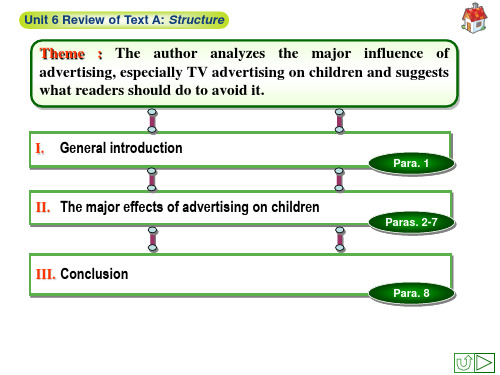
(Para.1) Advertising, especially influence on your children.
Unit 6 Review of Text A: Structure
Part Two (Paras. 2 – 7) The major effects of advertising on children
I.
General introduction
Para. 1
II. The major effects of advertising on children
Paras. 2-7
III. Conclusion
Para. 8
Unit 6 Review of Text A: Structure
Part One (Para. 1) General introduction
Advertising Promotes Violent Games and Videos
studies link watch violence on TV desensitization to violence aggressive behavior advertisements aim at promote violent movies video games affect media preferences
Unit 6 Review of Text A: Retelling
Advertising Encourages Early Drinking and Smoking be exposed to be more likely to positive feelings use young develop brand awareness characters cite the Surgeon General’s conclusion
滥用广告误导孩子的英文作文
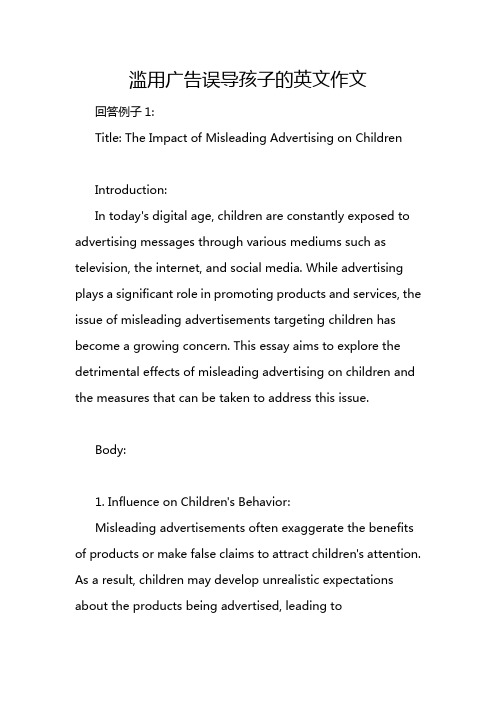
滥用广告误导孩子的英文作文回答例子1:Title: The Impact of Misleading Advertising on ChildrenIntroduction:In today's digital age, children are constantly exposed to advertising messages through various mediums such as television, the internet, and social media. While advertising plays a significant role in promoting products and services, the issue of misleading advertisements targeting children has become a growing concern. This essay aims to explore the detrimental effects of misleading advertising on children and the measures that can be taken to address this issue.Body:1. Influence on Children's Behavior:Misleading advertisements often exaggerate the benefits of products or make false claims to attract children's attention. As a result, children may develop unrealistic expectations about the products being advertised, leading todisappointment when the reality does not meet their expectations. For example, a toy advertised as having amazing features may turn out to be of poor quality, causing frustration and disillusionment among children.2. Impact on Self-esteem:Advertising messages often portray an idealized image of beauty, success, and happiness, which can negatively impact children's self-esteem. When children are constantly bombarded with images of flawless models or celebrities endorsing products, they may develop insecurities about their own appearance or abilities. This can lead to feelings of inadequacy and low self-worth, as children strive to live up to unrealistic standards set by advertising.3. Financial Consequences:Misleading advertisements can also have financial consequences for children and their families. Children may pester their parents to purchase products that are falsely advertised as essential or superior, leading to unnecessary spending. Moreover, parents may end up buying products that do not deliver on their promises, wasting their hard-earnedmoney. In extreme cases, children may even resort to stealing or engaging in other unethical behavior to obtain the products they desire, influenced by deceptive advertising tactics.4. Educational Implications:Misleading advertising can undermine children's critical thinking skills and their ability to discern fact from fiction. When children are repeatedly exposed to deceptive marketing practices, they may become desensitized to them and accept false information without question. This can hinder their academic performance and ability to make informed decisions in other aspects of their lives. Therefore, addressing the issue of misleading advertising is crucial for promoting media literacy and empowering children to become discerning consumers.5. Regulatory Measures:To combat the harmful effects of misleading advertising on children, regulatory measures need to be implemented. Governments should enforce stricter regulations on advertising content targeting children, ensuring thatadvertisements are truthful, transparent, and age-appropriate. Advertisers should be held accountable for deceptive practices and face penalties for violating advertising standards. Additionally, parents and educators play a vital role in teaching children to critically evaluate advertising messages and recognize deceptive tactics.Conclusion:In conclusion, the prevalence of misleading advertising poses significant risks to children's well-being, influencing their behavior, self-esteem, finances, and education. It is imperative that stakeholders, including governments, advertisers, parents, and educators, work together to address this issue and protect children from deceptive marketing practices. By promoting media literacy and enforcing stricter regulations on advertising content, we can create a safer and more ethical environment for children to grow and thrive.回答例子2:Title: The Misuse of Advertising and Its Deceptive Influence on ChildrenIn today's digital age, advertising has become anomnipresent force, penetrating every aspect of our lives. While advertising serves as a powerful tool for promoting products and services, its misuse often leads to the manipulation and deception of vulnerable consumers, particularly children. In this essay, we will explore the detrimental effects of advertising abuse on children and the measures that can be taken to mitigate its influence.Firstly, it's crucial to acknowledge the pervasive nature of advertising in children's lives. From television commercials to social media influencers, children are constantly exposed to messages promoting various products and lifestyles. Moreover, advertisers often employ persuasive techniques tailored to appeal to children's emotions and desires, making it challenging for them to discern between genuine information and manipulative tactics.One of the most concerning aspects of advertising abuse is its potential to instill unhealthy consumption habits in children. By glamorizing certain products and lifestyles, advertisers create unrealistic expectations and desires in young minds, leading to excessive consumption and materialism. Thisphenomenon not only contributes to environmental degradation but also exacerbates social inequalities, as children from lower-income families may feel pressured to acquire expensive goods to fit in with their peers.Furthermore, advertising abuse can have a detrimental impact on children's self-esteem and body image. In an era dominated by beauty standards perpetuated by the media, advertisements often promote unrealistic ideals of beauty and perfection, causing children to develop negative body perceptions and low self-esteem. This can lead to a range of mental health issues, including depression, anxiety, and eating disorders, as children strive to attain unattainable standards set by advertisers.Moreover, the deceptive nature of advertising can lead to the dissemination of false or misleading information to children. Advertisers may exaggerate the benefits of their products while downplaying potential risks, leading children to make uninformed decisions about their health andwell-being. For example, advertisements for sugary snacks and beverages often neglect to mention their adverse effectson dental health and overall nutrition, contributing to the rise of childhood obesity and related health problems.In light of these challenges, it is imperative to take proactive measures to protect children from the harmful effects of advertising abuse. One approach is to promote media literacy and critical thinking skills among children from a young age, empowering them to analyze and evaluate advertising messages critically. By teaching children to question the motives behind advertisements and recognize persuasive techniques, we can help them develop a more discerning approach to media consumption.Additionally, policymakers and regulatory bodies play a crucial role in enforcing stricter guidelines for advertising aimed at children. By implementing regulations that restrict the use of deceptive or manipulative tactics in children's advertising, we can create a safer and more transparent media environment for young consumers. Furthermore, parents and caregivers should actively monitor their children's media consumption and engage in open discussions about the influence of advertising on their perceptions and behaviors.In conclusion, the misuse of advertising poses a significant threat to the well-being and development of children, as it perpetuates unrealistic expectations, undermines self-esteem, and disseminates false information. By raising awareness of these issues and implementing effective strategies to combat advertising abuse, we can create a healthier and more responsible media landscape for future generations. It is essential to prioritize the protection of children's rights and ensure that advertising serves as a tool for empowerment rather than exploitation.。
英语口语
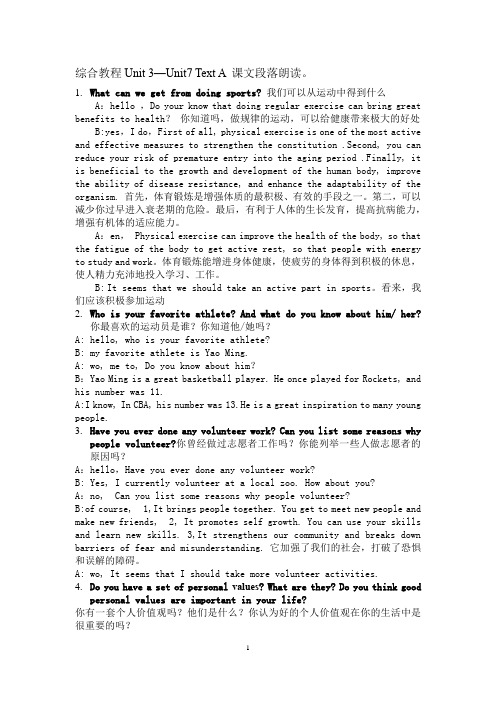
综合教程Unit 3—Unit7 Text A 课文段落朗读。
1.What can we get from doing sports?我们可以从运动中得到什么A:hello ,Do your know that doing regular exercise can bring great benefits to health?你知道吗,做规律的运动,可以给健康带来极大的好处 B:yes,I do,First of all, physical exercise is one of the most active and effective measures to strengthen the constitution.Second, you can reduce your risk of premature entry into the aging period.Finally, it is beneficial to the growth and development of the human body, improve the ability of disease resistance, and enhance the adaptability of the organism.首先,体育锻炼是增强体质的最积极、有效的手段之一。
第二,可以减少你过早进入衰老期的危险。
最后,有利于人体的生长发育,提高抗病能力,增强有机体的适应能力。
A:en, Physical exercise can improve the health of the body, so that the fatigue of the body to get active rest, so that people with energy to study and work。
体育锻炼能增进身体健康,使疲劳的身体得到积极的休息,使人精力充沛地投入学习、工作。
广告对孩子有不良影响英语作文

广告对孩子有不良影响英语作文全文共3篇示例,供读者参考篇1The Negative Impact of Advertising on ChildrenIntroductionAdvertising is a powerful tool used by companies to persuade consumers to purchase their products or services. However, the impact of advertising on children has raised concerns as they are a vulnerable group that can be easily influenced. In this essay, we will explore the negative effects of advertising on children and discuss possible solutions to address this issue.Negative Impact of Advertising on Children1. Unhealthy Food Choices: Many advertisements target children with unhealthy food products that are high in sugar, salt, and fat. These advertisements can lead to poor dietary habits and contribute to the rise in childhood obesity.2. Materialism: Advertising often promotes a culture of materialism by encouraging children to associate happiness andsuccess with the possession of material goods. This can lead to a sense of dissatisfaction and low self-esteem in children who cannot afford these products.3. Unrealistic Beauty Standards: Advertisements often portray unrealistic beauty standards that can negatively impact children's self-image and confidence. This can lead to body dissatisfaction and even eating disorders in some cases.4. Violent and Inappropriate Content: Some advertisements contain violent or inappropriate content that can desensitize children to real-life violence and encourage aggressive behavior.Solutions to Address the Issue1. Regulation: Governments should implement stricter regulations on advertising directed towards children. This can include restrictions on the types of products that can be advertised to children and the content of the advertisements.2. Parental Guidance: Parents play a crucial role in protecting their children from the negative effects of advertising. By talking to their children about the messages in advertisements and promoting critical thinking skills, parents can help their children make informed decisions.3. Media Literacy Education: Schools should incorporate media literacy education in their curriculum to teach children how to critically analyze and interpret advertisements. This can help children become more discerning consumers and resist the influence of deceptive advertising.4. Responsible Advertising: Companies should practice responsible advertising by avoiding deceptive or manipulative tactics aimed at children. They should prioritize the well-being of children over profits and promote products that are beneficial to their health and development.ConclusionIn conclusion, the negative impact of advertising on children is a pressing issue that requires attention from all stakeholders. By implementing stricter regulations, promoting parental guidance, and providing media literacy education, we can protect children from the harmful effects of advertising and promote their well-being. It is essential to create a healthy and safe advertising environment for children to ensure that they can grow up without being negatively influenced by commercial messages.篇2The Negative Impact of Advertising on ChildrenAdvertising is everywhere in our society, it bombards us from every direction- on television, on the internet, on billboards, and in magazines. While advertising can be a powerful tool for companies to promote their products and increase sales, it can also have a negative impact on children. Children are particularly vulnerable to the effects of advertising due to their impressionable minds and limited ability to understand persuasive techniques. In this essay, we will explore the various ways in which advertising can negatively impact children.First and foremost, advertising can promote unhealthy habits and lifestyles in children. Many advertisements promote fast food, sugary snacks, and sugary beverages which can contribute to childhood obesity and other health issues. Children are often drawn to these unhealthy products because they are marketed in a fun and appealing way. Additionally, advertising can promote unrealistic beauty standards which can lead to body image issues and low self-esteem in children. Advertisements for beauty products, fashion brands, and cosmetic surgery can make children feel insecure about their appearance and lead them to seek out harmful and unnecessary products and procedures.Furthermore, advertising can encourage materialism and consumerism in children. Children are constantly bombarded with messages that tell them they need the latest toys, gadgets, and clothes in order to be happy or successful. This can lead to feelings of inadequacy and a never-ending desire for more possessions. Children may also develop a sense of entitlement and expect their parents to fulfill their every want and need, leading to conflict within the family. Additionally, advertising can promote stereotypes and reinforce gender roles in children. Many advertisements depict traditional gender roles and stereotypes which can limit children's understanding of diversity and equality.In addition to promoting unhealthy habits, consumerism, and stereotypes, advertising can also have a negative impact on children's cognitive development. Children are exposed to a constant stream of advertisements which can overload their brains and distract them from other more important tasks, such as schoolwork or social interactions. Studies have shown that exposure to advertising can impair children's ability to focus, concentrate, and retain information. Additionally, advertising can perpetuate a culture of instant gratification and impatience in children. Many advertisements promote products and services that promise quick fixes and instant results, leading children tobelieve that they should always get what they want when they want it.In conclusion, advertising can have a powerful and negative impact on children in a variety of ways. From promoting unhealthy habits and consumerism to reinforcing stereotypes and limiting cognitive development, advertising can shape the way children view themselves and the world around them. It is important for parents, educators, and policymakers to be aware of these negative effects and take steps to mitigate them. By monitoring children's exposure to advertising, promoting critical thinking skills, and encouraging media literacy, we can help children navigate the complex world of advertising and make informed decisions about the products and messages they encounter. Ultimately, we must work together to create a society that values the well-being and development of children above all else.篇3In today's modern society, advertisements are everywhere. Whether it's on television, on the internet, or on billboards, children are exposed to a steady stream of advertisements from a very young age. While advertisements can have some positive effects on children, such as providing information about newproducts and services, they can also have a number of negative effects. In this essay, we will explore the ways in which advertisements can have a detrimental impact on children.First and foremost, advertisements can have a negative impact on children's self-esteem and body image. Many advertisements promote unrealistic beauty standards, showing models who are heavily photoshopped and only represent a very narrow definition of beauty. This can lead children to feel insecure about their own appearance and develop unhealthy attitudes towards their bodies. Research has shown that exposure to idealized images of beauty in advertisements can contribute to the development of body image issues and eating disorders in children.In addition to promoting unrealistic beauty standards, advertisements can also encourage materialism and a culture of consumerism in children. Advertisements often portray happiness and success as being contingent upon the acquisition of material possessions, leading children to believe that they need to buy the latest gadgets or clothing in order to be happy. This can create a sense of dissatisfaction and inadequacy in children, as they constantly feel the need to keep up with the latest trends in order to fit in with their peers.Furthermore, advertisements can have a negative impact on children's values and attitudes. Many advertisements promote values such as individualism and selfishness, encouraging children to prioritize their own desires and needs above those of others. This can contribute to a lack of empathy and social responsibility in children, as they are taught to prioritize their own interests at the expense of others. Additionally, advertisements often promote stereotypes and perpetuate harmful social norms, such as gender roles and racial biases, which can have a lasting impact on children's attitudes towards diversity and inclusivity.In conclusion, while advertisements can have some positive effects on children, such as providing information about new products and services, they can also have a number of negative effects. From promoting unrealistic beauty standards and materialism to shaping children's values and attitudes, advertisements can have a detrimental impact on children's mental and emotional well-being. It is essential for parents and educators to be aware of the potential harms of advertising and to teach children how to critically evaluate and deconstruct the messages they are exposed to in order to mitigate these negative effects. By fostering media literacy and encouragingchildren to think critically about the advertisements they see, we can help protect them from the harmful influence of advertising.。
广告对孩子的影响 英语作文
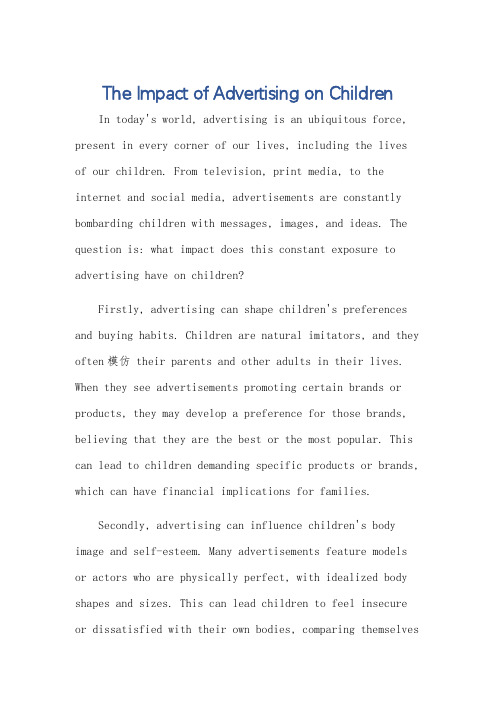
The Impact of Advertising on ChildrenIn today's world, advertising is an ubiquitous force, present in every corner of our lives, including the lives of our children. From television, print media, to the internet and social media, advertisements are constantly bombarding children with messages, images, and ideas. The question is: what impact does this constant exposure to advertising have on children?Firstly, advertising can shape children's preferences and buying habits. Children are natural imitators, and they often模仿 their parents and other adults in their lives. When they see advertisements promoting certain brands or products, they may develop a preference for those brands, believing that they are the best or the most popular. This can lead to children demanding specific products or brands, which can have financial implications for families.Secondly, advertising can influence children's body image and self-esteem. Many advertisements feature models or actors who are physically perfect, with idealized body shapes and sizes. This can lead children to feel insecure or dissatisfied with their own bodies, comparing themselvesto these unrealistic standards. Such feelings can have a negative impact on their self-esteem and confidence.Thirdly, advertising can encourage children to be materialistic. By constantly showing them shiny new toys, clothes, and gadgets, advertisements can foster a sense of entitlement among children, making them believe that they deserve to have the best and newest things. This mindset can have long-term consequences, such as leading to a dissatisfaction with life and a constant craving for more material possessions.However, it's important to note that advertising can also have some positive impacts on children. It can introduce them to new products and services that may be beneficial to them, such as educational toys or healthy foods. Additionally, advertising can stimulate children's creativity and imagination, encouraging them to think outside the box and be innovative.In conclusion, the impact of advertising on children is complex and multifaceted. While it can have negativeeffects on their preferences, body image, and materialism, it can also have positive impacts on their exposure to newideas and products. It is therefore crucial for parents and guardians to monitor and discuss the advertisements that their children are exposed to, helping them understand the messages behind them and fostering a healthy and balanced relationship with consumerism.**广告对孩子的影响**在当今社会,广告无处不在,渗透到我们生活的方方面面,包括孩子们的生活。
雅思高分范文广告对孩子影响
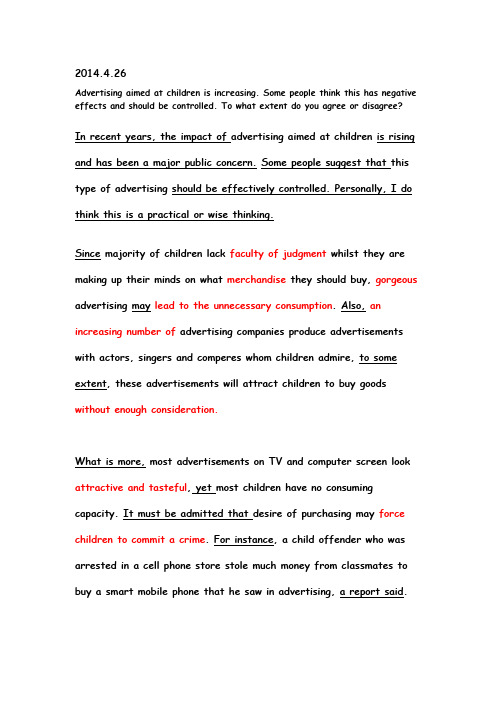
2014.4.26Advertising aimed at children is increasing. Some people think this has negative effects and should be controlled. To what extent do you agree or disagree?In recent years, the impact of advertising aimed at children is rising and has been a major public concern. Some people suggest that this type of advertising should be effectively controlled. Personally, I do think this is a practical or wise thinking.Since majority of children lack faculty of judgment whilst they are making up their minds on what merchandise they should buy, gorgeous advertising may lead to the unnecessary consumption. Also, an increasing number of advertising companies produce advertisements with actors, singers and comperes whom children admire, to some extent, these advertisements will attract children to buy goods without enough consideration.What is more, most advertisements on TV and computer screen look attractive and tasteful, yet most children have no consuming capacity. It must be admitted that desire of purchasing may force children to commit a crime. For instance, a child offender who was arrested in a cell phone store stole much money from classmates to buy a smart mobile phone that he saw in advertising, a report said.In addition to that, too much concentration on advertising will surely distract children’s attention from various aspects that they should have focused on, such as education, reading and physical training, which can not only help them do analysis from objective perspective, but enable them to lay a solid foundation to bright future as well.To sum up, controlling the a dvertising aimed at children indeed makes sense as almost all the influence it brings to children is damaging and negative.。
广告对孩子的影响 英语作文
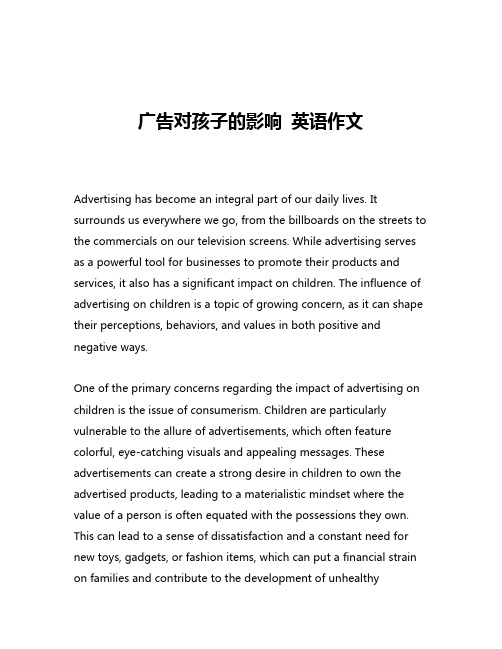
广告对孩子的影响英语作文Advertising has become an integral part of our daily lives. It surrounds us everywhere we go, from the billboards on the streets to the commercials on our television screens. While advertising serves as a powerful tool for businesses to promote their products and services, it also has a significant impact on children. The influence of advertising on children is a topic of growing concern, as it can shape their perceptions, behaviors, and values in both positive and negative ways.One of the primary concerns regarding the impact of advertising on children is the issue of consumerism. Children are particularly vulnerable to the allure of advertisements, which often feature colorful, eye-catching visuals and appealing messages. These advertisements can create a strong desire in children to own the advertised products, leading to a materialistic mindset where the value of a person is often equated with the possessions they own. This can lead to a sense of dissatisfaction and a constant need for new toys, gadgets, or fashion items, which can put a financial strain on families and contribute to the development of unhealthyspending habits.Moreover, many advertisements targeted at children promote unhealthy or unrealistic standards of beauty and body image. The use of thin, attractive models and the glorification of a certain physical appearance can lead to body image issues and low self-esteem in children, particularly during the formative years of their development. This can have long-lasting consequences, as children may grow up with a distorted perception of what constitutes a "normal" or "desirable" body type, leading to potential eating disorders or other health problems.Another concern regarding the impact of advertising on children is the way it can influence their values and decision-making. Advertisements often depict certain lifestyles, behaviors, and social norms as desirable or aspirational, which can shape children's perceptions of what is considered "cool" or "successful." This can lead to the promotion of materialism, consumerism, and even harmful behaviors, such as the use of alcohol or tobacco products.Furthermore, the targeting of children through advertising can be seen as a form of manipulation. Children, with their limited cognitive abilities and susceptibility to persuasive messages, may not fully understand the intent behind advertisements or the potential consequences of their purchasing decisions. This raises ethicalconcerns about the responsibility of advertisers and the need for greater regulation and oversight to protect children from exploitation.On the other hand, it is important to acknowledge that advertising can also have positive impacts on children. Advertisements can be used to promote important social messages, such as the importance of healthy eating, exercise, or environmental conservation. When done responsibly and with the well-being of children in mind, advertising can be a valuable tool for educating and informing young audiences about important issues.Additionally, some advertisements can inspire creativity and imagination in children, encouraging them to think outside the box and explore new ideas. Advertisements featuring engaging storytelling, memorable characters, or interactive elements can spark children's curiosity and foster their cognitive development.To mitigate the negative impacts of advertising on children, a multifaceted approach is necessary. Firstly, there should be stricter regulations and guidelines governing the content and placement of advertisements targeting children. This could include restrictions on the use of certain persuasive techniques, such as the use of celebrity endorsements or the promotion of unrealistic body standards.Furthermore, parents and educators should play a crucial role in educating children about the nature of advertising and how to critically analyze the messages they encounter. By teaching children to be discerning consumers, we can empower them to make informed decisions and develop a more balanced perspective on the role of advertising in their lives.Schools can also incorporate media literacy programs into their curricula, teaching children to understand the underlying motivations and techniques used in advertising. This can help children develop the critical thinking skills necessary to navigate the complex and often overwhelming world of advertising.In conclusion, the impact of advertising on children is a multifaceted issue that deserves careful consideration. While advertising can have both positive and negative effects, it is essential to prioritize the well-being and best interests of children. By implementing stricter regulations, educating children and families, and promoting media literacy, we can work towards a more balanced and responsible approach to advertising that empowers children to make informed choices and develop a healthy relationship with the products and services they encounter.。
孩子长时间看电视的危害作文英语

孩子长时间看电视的危害作文英语全文共3篇示例,供读者参考篇1The Harmful Effects of Children Watching Television for Extended Periods of TimeIn today's society, television has become a common form of entertainment for children. With the proliferation of shows and channels catering specifically to young audiences, many children are spending more and more time in front of the TV screen. While watching television can be a fun and relaxing activity, there are several potential risks and negative consequences associated with children watching TV for extended periods of time.One of the main concerns regarding children watching television is the impact it can have on their physical health. Sitting for long periods of time while watching TV can lead to a sedentary lifestyle, which is linked to a host of health problems such as obesity, heart disease, and diabetes. Additionally, excessive screen time can strain a child's eyes, leading to vision problems and headaches. The lack of physical activity andoutdoor play that often accompanies excessive TV watching can also hinder a child's physical development and coordination.Furthermore, watching television for prolonged periods of time can have negative effects on a child's cognitive development. Studies have shown that excessive screen time can impair a child's ability to concentrate, focus, and retain information. This can have a detrimental impact on their academic performance and overall learning abilities. In addition, excessive TV watching can lead to a decrease in creativity, imagination, and problem-solving skills, as children are passively consuming content rather than actively engaging in play or exploration.Another concern with children watching television is the potential for exposure to inappropriate content. With the rise of streaming services and online platforms, there is a wealth of content available that may not be suitable for young audiences. Children who watch TV unsupervised may be exposed to violence, sex, and other mature themes that can be disturbing and confusing for them. This can have a lasting impact on their emotional and psychological well-being, leading to anxiety, fear, and desensitization to violence.In addition to the physical and cognitive risks associated with excessive TV watching, there are also social implications to consider. Children who spend a significant amount of time in front of the television may have limited opportunities to interact with others and develop social skills. This can lead to difficulties in forming relationships, communicating effectively, and resolving conflicts. Furthermore, excessive screen time can detract from important family bonding time and hinder the development of a strong parent-child relationship.In conclusion, while television can be a source of entertainment and education for children, it is important to be mindful of the potential risks and negative effects associated with excessive TV watching. Parents should set limits on screen time, monitor the content that their children are watching, and encourage alternative forms of play and entertainment. By promoting a healthy balance between screen time and other activities, parents can help ensure that their children grow up happy, healthy, and well-rounded individuals.篇2The Harm of Children Watching TV for a Long TimeWith the rapid development of technology, television has become an indispensable part of our daily lives. Children, in particular, are often exposed to TV shows and programs, either for entertainment or educational purposes. While watching television can be beneficial in some ways, such as expanding children's knowledge and creativity, it can also have harmful effects if done excessively.First of all, one of the main dangers of children watching TV for a long time is the impact on their physical health. Sitting in front of the TV screen for hours on end can lead to a sedentary lifestyle, which can increase the risk of obesity and other health problems. Children who spend too much time watching TV are less likely to engage in physical activities, such as sports or outdoor play, which are essential for their overall well-being.Moreover, excessive TV watching can have a negative impact on children's mental health. Studies have shown that children who watch TV for extended periods are more likely to experience feelings of loneliness, depression, and anxiety. This is because excessive screen time can lead to a lack of social interaction and real-life experiences, which are crucial for children's emotional development.In addition, prolonged exposure to violent or inappropriate content on TV can have a harmful effect on children's behavior and attitudes. Many TV shows and programs contain scenes of violence, aggression, and other negative behaviors, which can influence children's perceptions and actions. Research has shown that children who watch a lot of violent TV shows are more likely to exhibit aggressive behavior and have trouble distinguishing between fantasy and reality.Furthermore, constant exposure to advertising on TV can also be detrimental to children's development. Advertisements often promote unhealthy foods, toys, and other products that can negatively impact children's habits and preferences. Children who watch a lot of TV are more likely to develop unhealthy eating habits, pester their parents for unnecessary products, and have a distorted view of reality due to the exaggerated nature of advertisements.In conclusion, while television can be a source of entertainment and education for children, it is essential to limit their screen time and monitor the content they are exposed to. Parents should encourage their children to engage in other activities, such as reading, playing outside, and spending time with family and friends, to promote their overall well-being. Bybeing mindful of the potential dangers of excessive TV watching, we can ensure that our children grow up healthy, happy, and well-rounded individuals.篇3The Harmful Effects of Children Watching TV for Extended PeriodsIn today's digital age, children are exposed to television and other electronic devices from a young age. While television can provide entertainment and educational content, excessive screen time can have harmful effects on children's development and well-being. In this essay, we will explore the various risks and dangers associated with children watching TV for extended periods.One of the primary concerns with children watching TV for long durations is the impact on their physical health. Sitting in front of the screen for too long can lead to a sedentary lifestyle, which can contribute to obesity and other health issues. Lack of physical activity can also affect children's motor skills and coordination, as they are not engaging in activities that promote movement and strength development.Moreover, prolonged TV viewing can have negative effects on children's mental health. Studies have shown that excessive screen time can lead to attention problems, hyperactivity, and behavioral issues in children. This is because the fast-paced nature of television programming can overstimulate young minds and make it difficult for them to focus on tasks that require sustained attention.Another concern is the impact of television content on children's social and emotional development. Many TV shows and commercials promote unrealistic body ideals, stereotypes, and unhealthy behaviors, which can negatively influence children's self-esteem and perceptions of the world. Exposure to violence, aggression, and inappropriate content can also desensitize children and lead to aggressive behavior and desensitization to violence.In addition to these risks, excessive TV viewing can also have a detrimental effect on children's academic performance. Research has shown that children who watch more TV tend to have lower grades and perform poorly in school. This is because screen time can interfere with sleep patterns, concentration, and cognitive development, making it harder for children to focus and retain information.Furthermore, prolonged exposure to screens, such as TVs, tablets, and smartphones, can have adverse effects on children's eyesight. This is due to the blue light emitted by electronic devices, which can strain the eyes and disrupt the sleep-wake cycle. Over time, this can lead to eye problems such as eye strain, dry eyes, and even vision loss in extreme cases.To mitigate the harmful effects of children watching TV for extended periods, parents and caregivers should set limits on screen time and encourage alternative activities that promote physical, cognitive, and social development. Outdoor play, reading, arts and crafts, and interactive games can provide children with a well-rounded and enriching experience that fosters growth and learning.In conclusion, while television can be a valuable source of entertainment and education for children, excessive screen time can have detrimental effects on their health, development, and well-being. It is important for parents and caregivers to be mindful of the risks associated with prolonged TV viewing and take proactive measures to promote a balanced and healthy lifestyle for children. By setting limits on screen time and encouraging a variety of activities, we can ensure that children grow up to be healthy, happy, and well-rounded individuals.。
广告对儿童的负面影响英语作文
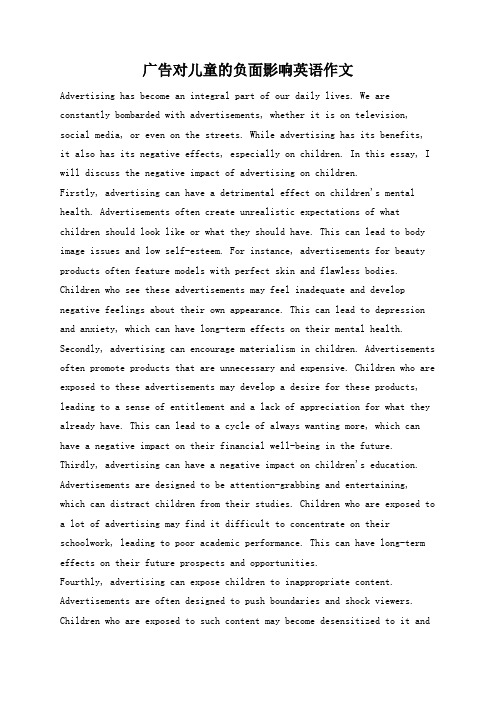
广告对儿童的负面影响英语作文Advertising has become an integral part of our daily lives. We are constantly bombarded with advertisements, whether it is on television, social media, or even on the streets. While advertising has its benefits,it also has its negative effects, especially on children. In this essay, I will discuss the negative impact of advertising on children.Firstly, advertising can have a detrimental effect on children's mental health. Advertisements often create unrealistic expectations of what children should look like or what they should have. This can lead to body image issues and low self-esteem. For instance, advertisements for beauty products often feature models with perfect skin and flawless bodies. Children who see these advertisements may feel inadequate and develop negative feelings about their own appearance. This can lead to depression and anxiety, which can have long-term effects on their mental health. Secondly, advertising can encourage materialism in children. Advertisements often promote products that are unnecessary and expensive. Children who are exposed to these advertisements may develop a desire for these products, leading to a sense of entitlement and a lack of appreciation for what they already have. This can lead to a cycle of always wanting more, which can have a negative impact on their financial well-being in the future.Thirdly, advertising can have a negative impact on children's education. Advertisements are designed to be attention-grabbing and entertaining, which can distract children from their studies. Children who are exposed to a lot of advertising may find it difficult to concentrate on their schoolwork, leading to poor academic performance. This can have long-term effects on their future prospects and opportunities.Fourthly, advertising can expose children to inappropriate content. Advertisements are often designed to push boundaries and shock viewers. Children who are exposed to such content may become desensitized to it anddevelop a distorted view of what is acceptable. For instance, advertisements for alcohol or tobacco products may make these products seem attractive and desirable to children, leading to unhealthy habits and behaviors.Finally, advertising can have a negative impact on family dynamics. Advertisements often promote products that are not necessary, leading to conflicts between parents and children. Children may pressure their parents to buy these products, causing financial strain and tension in the family. This can lead to a breakdown in communication and trust, which can have long-term effects on the family dynamic.In conclusion, advertising can have a negative impact on children in many ways. It can affect their mental health, encourage materialism, affecttheir education, expose them to inappropriate content, and create conflicts within families. As a society, we need to be more aware of the negative effects of advertising on children and take steps to protect them from harmful content. This can include regulating advertising aimed at children, promoting media literacy, and encouraging parents to have open and honest conversations with their children about the impact of advertising. Only by working together can we create a safer and healthier environment for our children.。
广告对小孩的影响
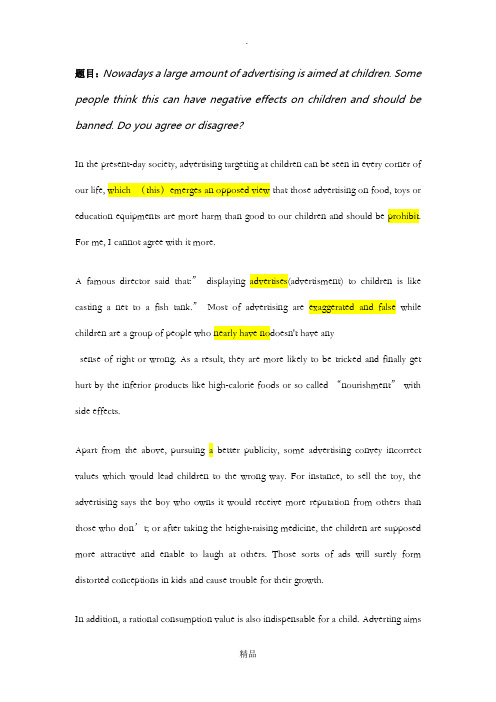
题目:Nowadays a large amount of advertising is aimed at children. Some people think this can have negative effects on children and should be banned. Do you agree or disagree?In the present-day society, advertising targeting at children can be seen in every corner of our life, which (this)emerges an opposed view that those advertising on food, toys or education equipments are more harm than good to our children and should be prohibit. For me, I cannot agree with it more.A famous director said that:”displaying advertises(advertisment) to children is like casting a net to a fish tank.”Most of advertising are exaggerated and false while children are a group of people who nearly have nodoesn't have anysense of right or wrong. As a result, they are more likely to be tricked and finally get hurt by the inferior products like high-calorie foods or so called “nourishment” with side effects.Apart from the above, pursuing a better publicity, some advertising convey incorrect values which would lead children to the wrong way. For instance, to sell the toy, the advertising says the boy who owns it would receive more reputation from others than those who don’t; or after taking the height-raising medicine, the children are supposed more attractive and enable to laugh at others. Those sorts of ads will surely form distorted conceptions in kids and cause trouble for their growth.In addition, a rational consumption value is also indispensable for a child. Adverting aimsat stimulating customer spending, which is opposite to traditional virtues like thrift, independence and hard- working. A large number of children are unable to resist those temptation-delicious food or fine toys, then regard materials as the source of happiness. After the conception of materialism has been cultivated, the children will not only pay money but also their life for it. Overall, being exposed in advertising can be detrimental for our kid both in health and value. There is no doubt that banning those children ads is not practical but they surely should be correctly guided by the government.。
广告危害儿童英文作文

广告危害儿童英文作文Advertising harms children in many ways. It exposes them to inappropriate content and encourages materialism and unhealthy eating habits. Children are easily influenced by advertising and may not have the ability to critically evaluate the messages they receive.Advertisements often portray unrealistic beauty standards, leading to body image issues and low self-esteem in children. They also promote gender stereotypes, limiting children's understanding of diversity and equality. This can have long-term negative effects on their social and emotional development.In addition, advertising can lead to excessive consumption and wastefulness. Children are constantly bombarded with messages to buy the latest toys, gadgets, and fast food, which can contribute to a culture of overconsumption and environmental degradation.Furthermore, advertising can intrude on children's privacy and personal space. With the rise of targeted advertising and data collection, children are increasingly exposed to personalized ads that track their onlinebehavior and preferences, leading to concerns about their digital privacy and security.Moreover, advertising can negatively impact children's cognitive development. Excessive exposure to commercialsand marketing messages can impair their ability to concentrate, think critically, and make independent decisions. It can also contribute to attention and learning disorders.Overall, the pervasive nature of advertising poses a significant threat to children's well-being and development. It is important for parents, educators, and policymakers to take action to protect children from the harmful effects of advertising and promote a more responsible and ethical approach to marketing to children.。
麦当劳广告对孩子的影响 英语作文

麦当劳广告对孩子的影响英语作文The Impact of McDonald's Advertising on ChildrenWith the rise of fast food culture, McDonald's has become one of the most recognizable and popular fast food chains in the world. Known for its catchy jingles, colorful ads, and enticing promotions, McDonald's has a strong influence on children's eating habits and preferences. In this essay, we will explore the impact of McDonald's advertising on children and the potential consequences it may have on their health and well-being.First and foremost, McDonald's advertising targets children through various mediums such as television, radio, online platforms, and even in schools. The fast food giant utilizes colorful and engaging ads featuring beloved cartoon characters, celebrities, and popular toys to attract children's attention and create a sense of excitement around their products. As a result, children are often drawn to McDonald's as a fun and desirable dining option, leading to repeated visits and a preference for fast food over healthier alternatives.Moreover, McDonald's advertising promotes unhealthy eating habits and food choices among children. The fast food chain is notorious for its high-calorie, high-fat, and high-sugarmenu items, which can contribute to obesity, diabetes, and other health issues in children. By glamorizing these unhealthy foods in their ads and promotions, McDonald's is normalizing and even encouraging poor dietary habits among children, who may not be fully aware of the negative impact of fast food on their health.Furthermore, McDonald's advertising can have a lasting impact on children's attitudes towards food and nutrition. Research has shown that exposure to food ads, especially those promoting unhealthy products, can influence children's food preferences, cravings, and consumption patterns. For example, children who are continuously exposed to McDonald's ads may develop a strong preference for fast food and a disinterest in fruits, vegetables, and other nutritious foods. This can lead to long-term consequences for their health, as a diet high in fast food and low in nutrients can increase the risk of obesity, heart disease, and other chronic conditions.In addition, McDonald's advertising can also contribute to the commercialization of childhood and the promotion of materialism among children. By associating their products with popular toys, movies, and entertainment franchises, McDonald's creates a sense of consumerism and desire among children, who may feel pressured to buy or consume their products in order tofit in or feel happy. This can lead to a culture of excessive consumption, where children are encouraged to prioritize material possessions and instant gratification over health,well-being, and sustainability.In conclusion, McDonald's advertising has a significant impact on children's eating habits, attitudes towards food, and overall well-being. By targeting children through engaging ads, promoting unhealthy food choices, and contributing to the commercialization of childhood, McDonald's is playing a role in shaping children's preferences, behaviors, and perceptions of food and nutrition. It is essential for parents, educators, health professionals, and policymakers to address the influence of fast food advertising on children and promote healthier alternatives that prioritize their health, happiness, and future well-being. Only by raising awareness, advocating for change, and empowering children to make informed choices can we combat the harmful effects of McDonald's advertising and create a healthier, more sustainable food environment for future generations.。
2020年高考英语外刊时事命题阅读理解:儿童成为垃圾食品网上广告的目标群体
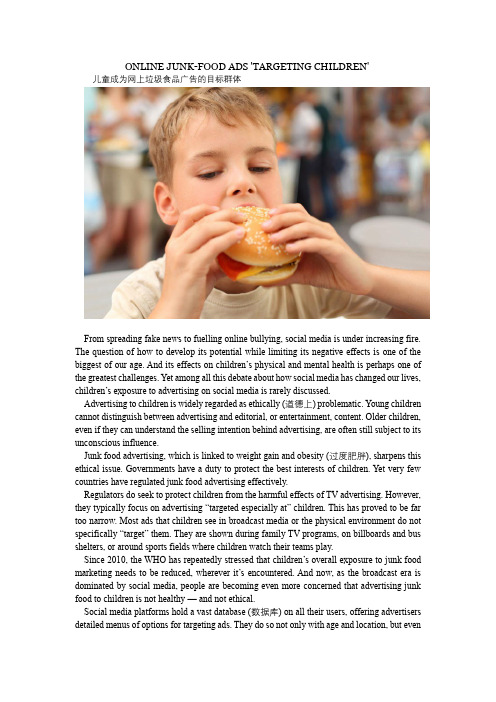
ONLINE JUNK-FOOD ADS 'TARGETING CHILDREN' 儿童成为网上垃圾食品广告的目标群体From spreading fake news to fuelling online bullying, social media is under increasing fire. The question of how to develop its potential while limiting its negative effects is one of the biggest of our age. And its effects on children’s physical and mental health is perhaps one of the greatest challenges. Yet among all this debate about how social media has changed our lives, children’s exposure to advertising on social media is rarely discussed.Advertising to children is widely regarded as ethically (道德上) problematic. Young children cannot distinguish between advertising and editorial, or entertainment, content. Older children, even if they can understand the selling intention behind advertising, are often still subject to its unconscious influence.Junk food advertising, which is linked to weight gain and obesity (过度肥胖), sharpens this ethical issue. Governments have a duty to protect the best interests of children. Yet very few countries have regulated junk food advertising effectively.Regulators do seek to protect children from the harmful effects of TV advertising. However, they typically focus on advertising “targeted especially at” children. This has proved to be far too narrow. Most ads that children see in broadcast media or the physical environment do not specifically “target” them. They are shown during family TV programs, on billboards and bus shelters, or around sports fields where children watch their teams play.Since 2010, the WHO has repeatedly stressed that children’s overall exposure to junk food marketing needs to be reduced, wherever it’s encountered. And now, as the broadcast era is dominated by social media, people are becoming even more concerned that advertising junk food to children is not healthy — and not ethical.Social media platforms hold a vast database (数据库) on all their users, offering advertisers detailed menus of options for targeting ads. They do so not only with age and location, but evenwith psychological characteristics and preferences. The platforms identify children who are most interested in junk food and its advertising, thereby influencing them more easily.Yet the very means of targeting children with ads on social media now provides regulators with an opportunity. Ireland’s Department of Health adopted a new code of practice (行业准则). The code states that “marketing communications for HFSS (high fat, salt and sugar) food by means of social media shall not target children under the age of 15.”It remains to be seen how the code will apply. It is only voluntary, and there is uncertainty about the accuracy of age information on social media. However, this is a significant advance on recent online junk food marketing restrictions, as it applies to all social media.(节选自the Independent)1. According to the author, the biggest problem with junk food advertising regulation is that ______.A. the authorities do not protect children from the negative effects of advertisingB. the authorities only focus on the ads designed to attract children’s attentionC. the authorities develop unrealistic policies on advertisingD. the authorities do not have the right to punish social media platforms2. Paragraph 6 mainly talks about ______.A. why social media advertising has developed quickly in recent yearsB. what social media platforms know about their usersC. how children will be affected by junk food advertising on social mediaD. why junk food advertising on social media has a bad effect on children3. The author’s attitude towards Ireland’s code of practice is ______.A. positiveB. negativeC. objectiveD. unclear单词:1. fake adj. not real and seeming to be sth. it is not, in order to deceive people 假的,伪造的2. editorial n. a piece of writing in a newspaper that gives the editor’s opinion about sth., rather than reporting facts 社论,社评3. sharpen★ v. to make a feeling stronger and more urgent 使(某种感觉)增强,加强4. regulate v. to control an activity or process, especially by rules (尤指通过规章)控制,管理→regulator n. 管理者,监管者5. specifically adv. relating to or intended for one particular type of person or thing only 特定地,专门地→specific adj. 特定的,具体的6. encounter v. to experience sth., especially problems or opposition 遇到,遭遇(尤指问题或反对)7. characteristic n. a quality or feature of sth. or sb. that is typical of them and easy to recognize 特征,特性8. identify /aI'dentIfaI/ v. to recognize and correctly name sb. or sth. 认出,识别→identification n. 识别,鉴定答案:1.B 2.D 3.C。
英语考试作文-雅思大作文写作真题范文之:广告对儿童的影响

英语考试作文雅思大作文写作真题范文之:广告对儿童的影响考鸭们都知道,2018年的雅思作文真题都来自于历史题库。
本文就为大家梳理历年雅思写作真题范文——媒体类话题:Television advertisement aimed at children. What effects of this on children? Should TV advertisement be controlled?——2014年4月24日题目讲解审题要点:关键词television advertising主要从两个方面完成此文章1.电视广告的影响2.是否应该控制电视广告参考思路:Para 1 开头段引入Para 2 影响1) 生理:长时间专注屏幕造成视力下降2) 心理:一些偏商业的广告会促使孩子购买一些不必要的零食或者玩具,形成不良饮食或生活习惯;另外,广告中出现的一些负面信息一定程度上影响孩子身心健康Para 3:电视广告是否应该被控制取决于这类广告的积极或者消极性质1) 一些具有教育意义的广告应该被鼓励2) 而另外一些有可能会导致盲目消费的广告就应该被控制Para 4 结尾段总结雅思写作大作文范文Currently, a debatable argument over whether children should be exposed to the environment teeming with TV advertising has already aroused public’s attention. According to the discussion, this article tends to focus on the effects it may cause on little children as well as point out the opinion towards whether it should be limited or not.目前,关于儿童是否应该被电视广告所吸引的争论已经引起了公众的关注。
广告对儿童影响英语作文
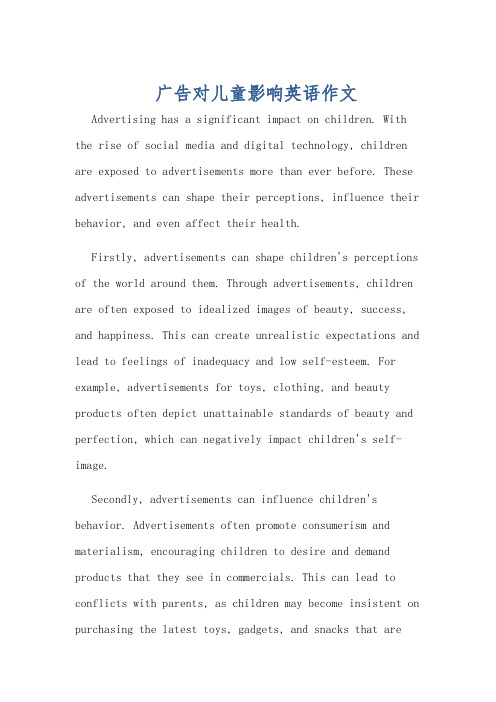
广告对儿童影响英语作文Advertising has a significant impact on children. With the rise of social media and digital technology, children are exposed to advertisements more than ever before. These advertisements can shape their perceptions, influence their behavior, and even affect their health.Firstly, advertisements can shape children's perceptions of the world around them. Through advertisements, children are often exposed to idealized images of beauty, success, and happiness. This can create unrealistic expectations and lead to feelings of inadequacy and low self-esteem. For example, advertisements for toys, clothing, and beauty products often depict unattainable standards of beauty and perfection, which can negatively impact children's self-image.Secondly, advertisements can influence children's behavior. Advertisements often promote consumerism and materialism, encouraging children to desire and demand products that they see in commercials. This can lead to conflicts with parents, as children may become insistent on purchasing the latest toys, gadgets, and snacks that areheavily advertised. Additionally, advertisements for unhealthy foods and sugary drinks can contribute to poor dietary choices and obesity among children.Furthermore, advertisements can affect children's health. The promotion of fast food, sugary snacks, and unhealthy beverages can contribute to the rise in childhood obesity and related health issues. In addition, advertisements for tobacco and alcohol can have a detrimental impact onchildren's health and well-being, as they may be influenced to engage in risky behaviors at a young age.In conclusion, advertising has a profound influence on children, shaping their perceptions, influencing their behavior, and affecting their health. It is important for parents, educators, and policymakers to be aware of the impact of advertising on children and to take steps to mitigate its negative effects. By promoting media literacy, critical thinking, and healthy lifestyles, we can help children navigate the pervasive influence of advertising in today's society.广告对儿童有着重大的影响。
广告对儿童的影响英语作文

广告对儿童的影响英语作文示例回答如下1:The Impact of Advertising on ChildrenAdvertising plays a significant role in our modern society and has a profound impact on children. With the rise of technology and the expansion of media platforms, children are exposed to advertisements more than ever before. While advertising can be informative and entertaining, it also has negative effects on children's behavior, values, and health.One of the major concerns regarding advertising's impact on children is the promotion of materialism and consumerism. Advertisements often create a desire for products that children may not necessarily need, leading to a culture of excessive consumption. This can result in children developing a sense of entitlement and a lack of appreciation for what they already have.Additionally, advertising can influence children's values and attitudes. Many advertisements portray unrealistic beauty standards, promoting body image issues and low self-esteemamong children. Moreover, advertisements often perpetuate gender stereotypes, reinforcing traditional roles and expectations. This can limit children's understanding of diversity and equality.Moreover, the influence of advertising on children's health cannot be ignored. Advertisements for unhealthy food and beverages often target children, promoting the consumption of sugary snacks and drinks. This contributes to the growing problem of childhood obesity and other health issues such as diabetes and heart disease.However, it is important to note that not all advertising is harmful. Some advertisements are educational and can enhance children's learning experiences. Advertisements that promote positive values, encourage creativity, and provide useful information can have a positive impact on children's development.To mitigate the negative effects of advertising on children, it is crucial for parents and educators to teach media literacy skills. By helping children critically analyze and evaluateadvertisements, they can become more discerning consumers and make informed choices. Additionally, regulations and restrictions on advertising targeted at children should be implemented to ensure that they are not exploited by advertisers.In conclusion, advertising has a significant impact on children, both positive and negative. While it can be informative and entertaining, advertising also promotes materialism, influences values, and affects children's health. By promoting media literacy and implementing regulations, we can minimize the negative effects and create a healthier advertising environment for children.广告对儿童的影响广告在现代社会中扮演着重要的角色,对儿童产生了深远的影响。
关于广告的英语作文
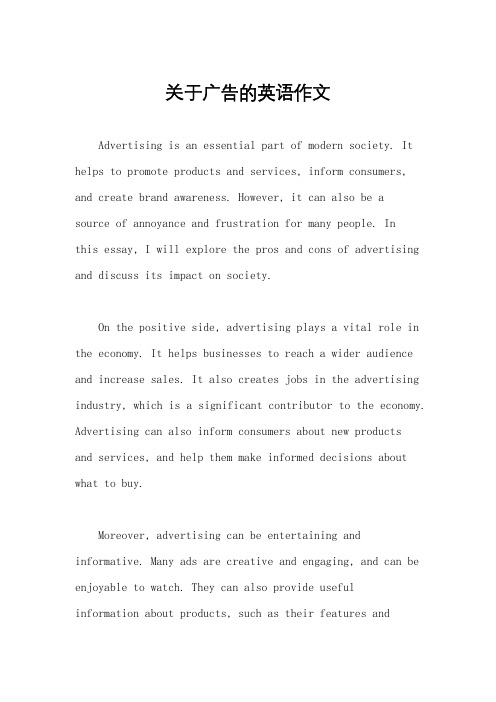
关于广告的英语作文Advertising is an essential part of modern society. It helps to promote products and services, inform consumers, and create brand awareness. However, it can also be asource of annoyance and frustration for many people. Inthis essay, I will explore the pros and cons of advertising and discuss its impact on society.On the positive side, advertising plays a vital role in the economy. It helps businesses to reach a wider audience and increase sales. It also creates jobs in the advertising industry, which is a significant contributor to the economy. Advertising can also inform consumers about new productsand services, and help them make informed decisions about what to buy.Moreover, advertising can be entertaining and informative. Many ads are creative and engaging, and can be enjoyable to watch. They can also provide usefulinformation about products, such as their features andbenefits. For example, a car ad might show the vehicle's safety features, fuel efficiency, and performance capabilities.However, advertising also has its downsides. One of the main criticisms of advertising is that it can be manipulative and misleading. Advertisers often use psychological techniques to persuade people to buy their products, such as creating a sense of urgency or appealing to people's emotions. They may also exaggerate the benefits of their products or make false claims about their effectiveness.Moreover, advertising can be intrusive and annoying. Many people find ads interruptive and disruptive,especially when they are trying to watch a TV show or browse the internet. Ads can also be deceptive, such as when they use misleading images or language to make products seem better than they are.Another concern about advertising is its impact on children. Children are particularly vulnerable toadvertising, as they may not have the critical thinkingskills to evaluate the claims made in ads. Advertisersoften target children with ads for sugary snacks and junk food, which can contribute to childhood obesity and other health problems.In conclusion, advertising has both positive and negative effects on society. While it can be informativeand entertaining, it can also be manipulative and intrusive. As consumers, we need to be aware of the techniques that advertisers use and be critical of the claims they make. We also need to be mindful of the impact of advertising on children and take steps to protect them from harmful ads. Ultimately, advertising is a powerful tool that can be used for good or for ill, and it is up to us to ensure that itis used responsibly.。
谈论广告对孩子危害的英语作文标题
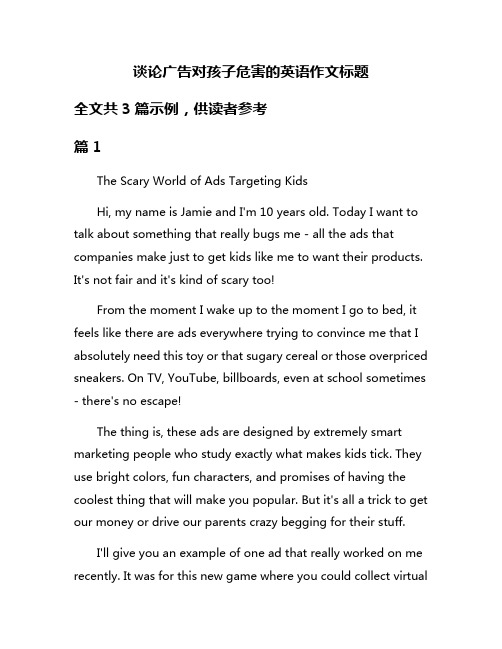
谈论广告对孩子危害的英语作文标题全文共3篇示例,供读者参考篇1The Scary World of Ads Targeting KidsHi, my name is Jamie and I'm 10 years old. Today I want to talk about something that really bugs me - all the ads that companies make just to get kids like me to want their products. It's not fair and it's kind of scary too!From the moment I wake up to the moment I go to bed, it feels like there are ads everywhere trying to convince me that I absolutely need this toy or that sugary cereal or those overpriced sneakers. On TV, YouTube, billboards, even at school sometimes - there's no escape!The thing is, these ads are designed by extremely smart marketing people who study exactly what makes kids tick. They use bright colors, fun characters, and promises of having the coolest thing that will make you popular. But it's all a trick to get our money or drive our parents crazy begging for their stuff.I'll give you an example of one ad that really worked on me recently. It was for this new game where you could collect virtualpets and battle them against other players online. The commercial showed all these kids around my age laughing and playing together, with these cute little pet characters doing funny dances. The voice-over guy was all "Gotta get 'em all! Which ones will you collect?!"I just had to have that game. I nagged my mom for weeks, throwing tantrums when she said no. I felt like if I didn't get it, I would be left out and uncool compared to the other kids. Finally she broke down and spent 60 on it for my birthday. Guess what? The game was boring after a week and you had to pay even more money to get new pets.That's just one example, but it happens all the time with ads for games, toys, clothes, snacks, you name it. They make the products look so awesome and life-changing, but really they just want to take our money. And half the time, the thing itself isn't nearly as fun or cool as they made it seem.Another really mean trick they play is using famous characters or TV personalities that kids love. If there's an ad with Spider-Man or one of those YouTube gamers kids watch, we automatically want whatever they're selling because we feel connected to them. It's really manipulative!The snack food ads are probably the worst though. All those colorful, sugary cereals and candies overloaded with cartoons and silly skits to brainwash kids into begging their parents. And don't get me started on the fast food ads with those creepy corporate mascots trying to be "hip" and "cool" to sell buckets of unhealthy fried food.I'm not saying every ad aimed at kids is bad or that companies are evil for advertising. And sure, some products end up being good. But a lot of it is just dirty tactics preying on kids' vulnerability and underdeveloped brains. We don't fully understand persuasive advertising at this age, nor can we think through all the consequences of wanting stuff.Kids my age are at a hugely impressionable phase. We just want to fit in, be accepted by our peers, and feel cool. So when we see these crazy exaggerated ads showing the trendiest toys and foods, we can't help but crave them. Companies exploit that in really unethical ways, in my opinion.I'm lucky that my parents are pretty good about saying no and explaining why we shouldn't always buy stuff just because an ad made it look awesome. But lots of kids have parents who get worn down by relentless nagging and spoil their kids to keepthem happy. Next thing you know, that kid is overweight and has a room full of expensive junk they got bored with after a week.So what can be done about this advertising problem? Well, some countries have made it illegal to directly advertise to young kids, which I think is a good idea. Parents and teachers can also educate kids better on how ads work and not to take them so literally. For older kids, we could learn skills to think more critically about ads and not just passively believe everything they're selling us.At the end of the day though, I think companies need to be more responsible too. Maybe tone down the in-your-face brainwashing and give us a little more credit, you know? Make ads that are more honest about the product instead of making everything seem so hyped up and life-alteringly essential. Have a bit of ethics and don't prey on kids' minds so aggressively just to make a buck.Anyway, that's my rant on the crazy world of advertising to children these days! I know I'm just a 10-year-old kid, but I'm old enough to recognize these manipulative tricks for what they are. Ads don't have to disappear completely, but kids do need better protection from the greedy companies who'd do anything to stick their virtual hands in our virtual pockets. It's just not cool.篇2Here's an essay on the dangers of advertising for children, written from a child's perspective, approximately 2000 words in length:The Hidden Dangers of Ads: A Kid's Eye ViewHi there! My name is Timmy, and I'm 10 years old. I love playing video games, reading comic books, and watching cartoons. But there's one thing that really bugs me – all the ads I see everywhere!You can't escape them, no matter where you go. They're on TV, in movies, on websites, and even in video games. And you know what? A lot of these ads are targeted at kids like me, trying to get us to buy their products or beg our parents for them.At first, the ads might seem harmless. They show cool toys, tasty snacks, and fun games that look awesome. But the more I pay attention, the more I realize how sneaky and manipulative these ads can be. Let me tell you about some of the problems I see with them.They make everything look perfectHave you ever noticed how the toys in ads always look so much better than the real thing? The action figures move smoothly, the dolls have perfect hair, and the cars never break or lose pieces. But when you actually get the toy, it's often a disappointment.The same goes for food ads. The burgers look juicy and delicious, the fries are crispy and golden, and the shakes are thick and creamy. But in reality, the food rarely looks or tastes as good as it does in the ads. It's like they're lying to us, and that's not fair.They use tricks to get our attentionAdvertisers are really good at coming up with catchy jingles, bright colors, and funny characters to grab our attention. They know that kids are easily distracted and attracted to things that are loud, flashy, and entertaining.Sometimes, they even try to make their ads look like part of the show or game we're watching, so it's hard to tell what's an ad and what's not. That's really sneaky if you ask me!They make us feel left outA lot of ads try to make us feel like we're missing out if we don't have their product. They show kids having fun, beingpopular, or feeling cool because they have a certain toy or gadget. It's like they're saying, "If you don't have this, you're not cool and you're not part of the group."That's just mean! It makes kids feel bad about themselves and puts pressure on them (and their parents) to buy things they might not even need or want.They don't tell the whole truthAds often leave out important information or stretch the truth to make their products look better. They might not mention how much something costs, or they might make it seem like a toy does a lot more than it really does.Sometimes, they even use tricks like making the toys look bigger than they are or using special effects to make the food look more appealing. It's like they're trying to trick us into wanting their stuff, and that's not cool.They target kids in sneaky waysAdvertisers know that kids are easily influenced, so they try to reach us in all sorts of sneaky ways. They put ads in our favorite shows, games, and websites. They put their logos and characters on our clothes, backpacks, and lunchboxes. They even sponsor events and activities that kids like.It's like they're following us everywhere, and it's really hard to avoid their messages. It's like they're trying to brainwash us or something!So, what can we do about all these annoying and tricky ads? Well, I think it's important for kids to be aware of how ads work and not to fall for their tricks. We should ask questions, think critically, and not just believe everything we see or hear.It's also important for parents, teachers, and other adults to teach us about media literacy and how to spot sneaky advertising tactics. They should also try to limit the amount of advertising we're exposed to, especially in places like schools and playgrounds.And maybe, just maybe, the companies that make these ads could try being a little more honest and respectful towards kids. Instead of trying to trick us, they could just tell us the truth about their products and let us decide if we really want them or not.At the end of the day, we're just kids trying to have fun and learn about the world. We don't need to be bombarded with ads everywhere we go, and we definitely don't need to be manipulated or lied to. Let's keep ads out of our schools, playgrounds, and favorite shows, and let kids be kids!篇3The Harmful Effects of Advertising on KidsHi there! My name is Emma and I'm a 4th grader at Maple Glen Elementary School. Today I want to talk to you about something that really bothers me – all the advertising that is targeted at kids like me. It seems like everywhere I look, there are ads trying to sell me toys, games, snacks, clothes, and so much more. At first, the commercials and ads might seem fun and exciting, but after taking a closer look, I've realized that a lot of them can actually be harmful to kids. Let me explain why.The biggest issue I have with ads aimed at children is that they make us want to buy things that we don't really need. The ads make products look so cool, trendy, and fun that it's hard not to beg our parents to buy them for us. They use bright colors, popular characters from TV shows and movies, and make everything seem like the most amazing thing ever. But in reality, a lot of the products aren't nearly as great as the ads make them seem. After just a few days or weeks of playing with that "must-have" toy, we get bored with it and want the next big thing the ads are promoting.This constant desire for more stuff fueled by advertising is not only a waste of money for our parents, but it teaches kids bad habits. We start to become very materialistic and develop the mindset that we need to own lots of possessions to be happy. However, this just isn't true! Some of the best childhood memories I have don't involve fancy toys or games, but rather spending quality time with family, exploring the outdoors, using my creativity and imagination during unstructured playtime. Advertising robs us of appreciating the simple joys of childhood.Another major problem is that ads often promote unhealthy habits like eating junk food. I can't even count how many ads I've seen for sugary cereals, candy, sodas, and other snacks that are terrible for kids' health. The advertising companies know that using colorful animations, funny characters, and promising "amazing" taste will easily persuade kids to relentlessly beg their parents for those products. Even when I'm watching videos online, so many of the ads I see are for fast food restaurants enticing me with greasy burgers, fries, and shakes. Is it any wonder that so many kids these days are overweight or obese?Speaking of online videos, that's another huge issue – seeing ads everywhere on the internet, video games, and apps. It seems like no matter how innocent the website or game is, there willstill be flashy ads trying to sell something. This bombardment of advertising makes it really hard to just appreciate screen-free activities. Not to mention, there are a lot of inappropriate ads online featuring things not meant for kids. I've accidentally stumbled across ads for violent video games, adult products, and other disturbing content that no child should be exposed to. More regulations need to be in place to protect kids from viewing improper advertising online.Advertising has even started infiltrating our schools, which I think is really wrong. Why are we allowed to have advertisements for junk food like soda and candy displayed in our cafeterias? That just encourages unhealthy eating. Some schools have gone as far as allowing companies to advertise through programs and textbooks, or having sponsored scoreboards at sports events. A place for learning and growth should be free of corporate advertising influence.I've also noticed some concerning trends in ads related to toys and other products targeted to girls. So many of them perpetuate negative gender stereotypes. There are lots of commercials for dolls that promote an unrealistic, sexualized image of beauty. Or toys for girls that are focused on how they look rather than quality play experience. Girls are often toldthrough advertising that they should be obsessed with fashion, makeup, and domestic roles like cooking and cleaning. These types of ads limit girls' perspectives on their potential and what they can aspire to.The same goes for ads aimed at boys – they frequently reinforce aggressive tendencies, violence, and traditional "masculine" traits and interests. Whether it's toy weapons and action figures or sports-themed products, these ads boxes boys into rigid gender norms. Why can't advertising show that both boys and girls are free to embrace a wide range of skills, aspirations, and forms of expression outside of stereotypes?Ultimately, I believe that advertising directed at kids is unethical and does more harm than good. We are incredibly impressionable at this age and frequently cannot distinguish the objectives behind ads from reality. We absorb all of the materialistic, unhealthy, and socially regressive messages buried in kid-focused advertising campaigns. Instead of shaping our world views around what companies want to sell us, we should be allowed to develop naturally. Our self-worth, interests, and values shouldn't be defined by commercials and marketing ploys.Of course, advertising isn't going away anytime soon since companies will always want to profit from selling products. However, much stricter regulations need to be imposed, especially when it comes to advertising to kids. There should be policies around limiting commercials and ads during children's TV programming. Advertisements in schools need to be banned entirely. Tougher enforcement is needed for online advertising to prevent kids from being exposed to age-inappropriate content. More emphasis should be placed on educating kids about media literacy and developing critical thinking skills to see ads for what they truly are – manipulative tactics, not truth.We kids may be little, but we're a lot smarter than advertisers give us credit for. We don't need companies constantly pressuring us to buy their stuff through flashy commercials and promotions. I'd much rather have the opportunity and freedom to explore the world, learn new skills, use my creativity, and have rich experiences that can't be sold through advertising. There's so much more to life and being a kid than accumulating more stuff. Let's leave the materialistic mindset behind, stop blindly believing advertising claims, and start nurturing our inner selves beyond what the sellers want us to become.。
广告针对儿童(雅思大作文原创)
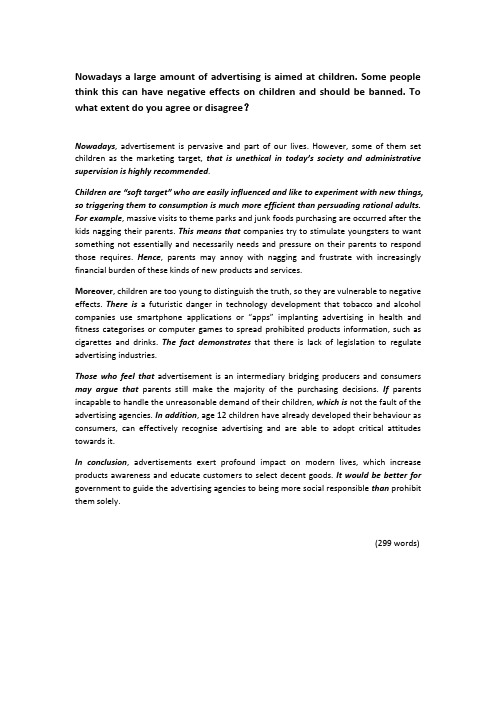
Nowadays a large amount of advertising is aimed at children. Some people think this can have negative effects on children and should be banned. To what extent do you agree or disagree?Nowadays, advertisement is pervasive and part of our lives. However, some of them set children as the marketing target, that is unethical in today’s society and administrative supervision is highly recommended.Children are “soft target” who are easily influenced and like to experiment with new things, so triggering them to consumption is much more efficient than persuading rational adults. For example, massive visits to theme parks and junk foods purchasing are occurred after the kids nagging their parents. This means that companies try to stimulate youngsters to want something not essentially and necessarily needs and pressure on their parents to respond those requires. Hence, parents may annoy with nagging and frustrate with increasingly financial burden of these kinds of new products and services.Moreover, children are too young to distinguish the truth, so they are vulnerable to negative effects. There is a futuristic danger in technology development that tobacco and alcohol companies use smartphone applications or “apps”implanting advertising in health and fitness categorises or computer games to spread prohibited products information, such as cigarettes and drinks. The fact demonstrates that there is lack of legislation to regulate advertising industries.Those who feel that advertisement is an intermediary bridging producers and consumers may argue that parents still make the majority of the purchasing decisions. If parents incapable to handle the unreasonable demand of their children, which is not the fault of the advertising agencies. In addition, age 12 children have already developed their behaviour as consumers, can effectively recognise advertising and are able to adopt critical attitudes towards it.In conclusion, advertisements exert profound impact on modern lives, which increase products awareness and educate customers to select decent goods. It would be better for government to guide the advertising agencies to being more social responsible than prohibit them solely.(299 words)__________________________________________________________________________Advertising to children is a sensitive and emotionally-charged issue because children are easily influenced and like to experiment with new things."making kids want what they don't need" and puts pressure on parents to respond to those needs.the average child watches about four hours of television a day and sees more than 20,000 commercials each year, often for high-fat, high-sugar and high-salt snacks and foods.In turn, parents must take responsibility for their children: monitor what they watch and read, determine how they spend their free time, and educate them to become responsible and informed consumers.。
- 1、下载文档前请自行甄别文档内容的完整性,平台不提供额外的编辑、内容补充、找答案等附加服务。
- 2、"仅部分预览"的文档,不可在线预览部分如存在完整性等问题,可反馈申请退款(可完整预览的文档不适用该条件!)。
- 3、如文档侵犯您的权益,请联系客服反馈,我们会尽快为您处理(人工客服工作时间:9:00-18:30)。
Effects Of Advertising On ChildrenThe ad-filmmakers are formulating fresh ways of enticing the consumers to buy their products. If an advertisement for a product attracts the consumers, they tend to purchase it frequently or at least give it a try. If a company has to survive in this competitive world, it has to project the image of its products in such a way that, they pick up the maximum sales, when they hit the stores. The best way to persuade the consumer to buy the product of a particular brand, out of the numerous choices available in the market, is attractive advertisement. These advertisements familiarize (使熟悉)kids with the latest products in the market and inculcate some good habits in them, such as, the ones related to dental hygiene(牙齿保健). However, the ad-filmmakers should remember that the commercials can also have negative impact on people, especially the young children. In this article, we have presented some of the most visible effects of advertising on children, positive as well as negative.Negative Effects Of Advertisement On Kids∙Advertisements encourage the children to persuade their parents to purchase the products shown in the commercials, whether useful or not. The little ones tend to get adamant(固执的) to buy the product.∙Children often tend to misinterpret(曲解) the messages conveyed in commercials(商业的). They overlook the positive side and concentrate more on the negatives.∙Many advertisements in the present times include dangerous stunts(动作), which can be performed only by experts. Even though, the commercials broadcast the statutory warnings with the advertisement, the kids often try to imitate the stunts at home, with fatal results.∙The flashy advertisement broadcast in television generates impulse shopping in children.∙Children, after watching the glitter of commercials, often lose the ability to live a life without materialistic joy. Gradually, they get used to a lifestyle which is reflected in television and other media.∙The kids usually get more attracted towards the costly branded products, such as jeans and accessories. They disregard the inexpensive, but useful, ones that are not shown in the commercials.∙Advertisements have an indirect effect on the behavior of children. They might develop temperamental(精神上的) tantrums(发怒), when deprived of the latest toys and clothes that are shown in the commercials.∙The personal preferences in clothing, toys, food and luxuries (豪华的)of children are altered by the advertisements, to a great extent.∙Junk foods, such as pizzas, burgers and soft drinks, are heavily promoted during children's programs. This develops a craving for fatty, sugary and fast foods in kids, thereby affecting their health adversely. These unhealthy eating habits lead to diseases, such as obesity. It even influences the way the kids think about the actual taste of food.∙The advertisements shown in the television are sometimes related to the use of tobacco(烟草), alcohol which adversely affects the kids. It makes the perception that, drinking beer makes you a cool person. The vulnerability of the kids towards these advertisements is a major concern.∙Advertising may affect the self-esteem of kids, as they feel inferior to others if they do not possess an endless array of products which are shown in the television.∙Some of the advertisements portray women as sex objects through flashy images, which creates a bad impact on the children.∙Almost all the advertisements do not convey the message clearly or children fail to comprehend the complete information. This can have an adverse effect on the children.∙As more and more commercials are becoming animated, there seems to be hardly any difference between the real life and TV advertisements. As a result, children are unable to understand the difference between real world and fantasy. Thus, these advertisements distort the sense of reality of kids.∙Studies have shown that, those kids who watch fast-paced television advertisements find it difficult to do tasks that take a much longer time, such as solving puzzles and reading.∙The more time children spend glued to television commercials, the less time they get to socialize, play, read and exercise, which are essential for the overall development of the kids.Positive Effects Of Advertisement On Kids∙Advertising makes the kids aware of the new products available in the market. It increases their knowledge about the latest innovations in the field of technology.∙Convincing advertisements, which center around healthy food products, can help improve the diet of a child, if they are attractive enough.∙Certain advertisements, with strong messages motivate the kids in chasing their future prospects such as becoming a doctor, scientist or an engineer. They generate the passion in children, regarding their future and makes them realize the importance of education.∙Some advertisements inculcate good habits in children, as all the toothpaste companies create strong awareness regarding dental hygiene in kids.false and violent advertisement should be banned, however, innovative and creative advertisement should be reservedBody 1: the negtive effects of advertisement on kids. influence the growth of children.1. false, maleviolent, violent advertisement have a bad guidency; 2. children will have a tendancy to swankBody 2: the negtive effects of advertisement on kids. influence the harmonious of family. 1.parents cannot aford the goods child see in the advertisment;2.parents cannot torture the endless purchase for goods, which both would cause a quarrel between parents and childrenBody 3: the positive effects of advertisement on kids.1. elevate and cultivate their creativity and imagination. 2. make them aware the lastest products and technology.Closing: we should ban advertisement which are bad, but some good and legal advertisement should be reserved.1 informative sentence from the video: Unsupervised viewing of advertising onTV caused the child to make early decisions about these habits: drugs use, alcoholic, sexual intercourse, tobacco use, anorexia.。
